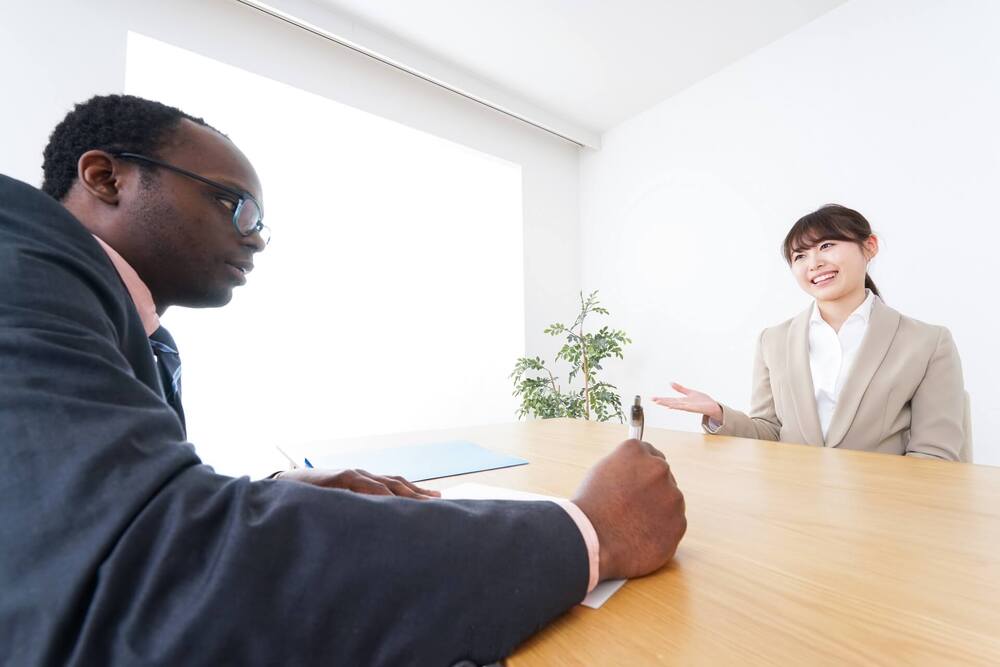「外資系企業の採用プロセスを詳しく把握しておきたい」
「外資系企業の採用に備えてしっかりと準備したい」
このように考えている人に向け、本記事では下記を解説していきます。
- 外資系企業の採用プロセス
- 外資系企業の面接のポイント
- 外資系企業の面接にあたり準備しておきたいこと
外資系企業での内定獲得に向け、しっかりと事前準備しておきたい人はぜひ参考にしてください。

「外資系企業の採用プロセスを詳しく把握しておきたい」
「外資系企業の採用に備えてしっかりと準備したい」
このように考えている人に向け、本記事では下記を解説していきます。
外資系企業での内定獲得に向け、しっかりと事前準備しておきたい人はぜひ参考にしてください。
I want to understand the hiring process of foreign companies in detail.
I want to be well-prepared for the hiring process at a foreign-affiliated company.
This article will explain the following for those who are thinking in this way.
Please refer to this section if you want to prepare well in advance to get a job offer from a foreign company.

外資系企業の採用プロセスは基本的に次の流れで進みます。
以下にて詳しく見ていきましょう。
外資系企業の採用プロセスは、まず応募者がオンラインで応募し、履歴書や職務経歴書などの書類を提出します。
その後、企業側が応募書類を審査し、適格な候補者を選考します。
応募の際は、求人情報に明記されている要件やスキルに応じて、履歴書や職務経歴書を作成しましょう。
必要な情報を的確に記載し、適切なフォーマットで提出することが大切です。
また自己PRや職務経歴書で、自身の強みや経験、達成した成果を具体的に示すことも重要になります。
応募先の求人要件や企業の価値観に合わせて、アピールポイントを強調するとよいでしょう。
選考プロセスの一環として、候補者に対するスクリーニングが行われます。
スクリーニングとは、外資系企業が設定した条件にマッチするかどうかをふるい分けすることです。
応募条件をクリアしていれば通過できることが多いですが、企業によっては候補者の基本的なスキルや経験、志望動機などを詳細に見るため、スクリーニング段階で落ちることもあります。
電話やZoomなどのオンラインプラットフォームを利用して面接が進められるケースも多いです。
この段階を一次面接と捉えてもよいでしょう。
この段階では、候補者の職務経験や資格、文化への適合性などが見られます。
また、企業によっては複数の社員と面接することもあります。
Web面接のポイントについては後ほど詳しく解説しますので併せてお読みください。
二次面接では、より詳細な面接やテストが実施されます。
この段階では、一次面接で評価されたスキルや経験をさらに掘り下げ、より深い議論や質問が行われることが一般的です。
二次面接では、一次面接で触れられたトピックや質問に関連する深堀りの質問が行われることが多いため、自身の経験やスキルについて詳細に説明できるように、準備を行いましょう。
また 二次面接では、応募者が企業の文化や価値観と適合するかどうかも重視されます。
自身の価値観や仕事スタイルが企業と一致することを示すために、事前に企業の文化や価値観について調査し、準備を行いましょう。
二次面接で定番とされる質問は次の通りです。
三次面接は、選考プロセスの最終段階であり、応募者と人事の責任者レベルとの間で行われることが多いです。
この段階では、候補者の適合性や文化への適合性が最終的に確認され、採用の最終決定が行われます。
三次面接では、候補者の深い洞察力や戦略的思考能力が評価されるため、企業のビジョンや戦略に関する質問に対して、的確かつ洞察力を示せる深い回答を用意しましょう。
また三次面接では、候補者が企業の文化や価値観にどれだけ適合しているかも評価されます。
企業の文化や価値観に合わせた回答や、過去の経験で示した企業の価値観への適合性を強調しましょう。
三次面接では次のような質問をされるケースが多いです。
レファレンスチェックは、候補者の過去の職務経験や能力を確認するために行われます。
企業は、応募者の実績や性格などをより深く理解するために、信頼できる情報源からさまざまな情報を収集し、活用しています。
たとえば、応募者の前職で一緒に働いていた上司や同僚、部下などからのフィードバックを収集します。
このため、応募者が虚偽の回答や書類を作成しているとすぐにバレてしまいます。
最終面接は、採用プロセスの最後の段階であり、候補者と最終決定者(代表や役員)との間で行われます。
この面接では、候補者の能力や適合性、企業文化への適合性などが最終的に確認され、面接後に企業は最終決定を下します。
最終面接では、過去の経験や実績に関する詳細な質問が行われることが多いです。
そのため、応募者はこれまでに果たした役割や達成した成果、解決した課題などを具体的に説明し、自身の能力を示すことが重要になります。
具体的な質問の候補は次の通りです。

The recruitment process for foreign companies basically proceeds as follows
Please see below for more details.
The hiring process for a foreign company begins with an online application and submission of documents such as a resume and curriculum vitae. The company then reviews the applications and selects qualified candidates.
When applying, prepare your resume and CV according to the requirements and skills specified in the job posting. It is important to provide the necessary information accurately and in the appropriate format.
It is also important to present your strengths, experience, and accomplishments in your personal statement and curriculum vitae. It is a good idea to emphasize the points that appeal to you in accordance with the job requirements of the company to which you are applying and the values of the company.
Part of the selection process involves screening candidates. Screening is the process of sifting candidates to see if they match the requirements set by the foreign company.
In most cases, if you meet the application requirements, you will pass the screening, but some companies may fail at the screening stage because they look at the candidate's basic skills, experience, motivation, and other details.
In many cases, interviews are conducted via telephone or online platforms such as Zoom. This stage can be viewed as the first round of interviews.
During this stage, the candidate's work experience, qualifications, and cultural fit are reviewed. Some companies may also interview more than one employee.
Please also read on for a more detailed explanation of the key points of the web interview later in this section.
In the second round of interviews, more in-depth interviews and tests are conducted. In this phase, the skills and experience evaluated in the first interview are further explored, and more in-depth discussions and questions are typically asked.
Second interviews often include in-depth questions related to the topics and questions touched on in the first interview, so be prepared to explain your experience and skills in detail.
The second interview also focuses on whether the applicant fits the culture and values of the company. Research and prepare for the culture and values of the company in advance to demonstrate that your values and work style match those of the company.
The following questions are considered standard for second interviews.
What do you consider most important when working in a team?
What made you interested in our company? What aspects of our culture and values do you share?
How do you want to develop your skills and experience in the future?
Please list your strengths and weaknesses in detail. How have you made the most of them?
The tertiary interview is the final stage of the selection process and is often conducted between the applicant and a level of HR responsibility. It is during this stage that the candidate's fit and cultural compatibility is finalized and the hiring decision is finalized.
During the tertiary interview, the candidate's deep insight and ability to think strategically are evaluated, so prepare in-depth answers that are accurate and demonstrate insight into questions about the company's vision and strategy.
The third interview also assesses how well the candidate fits into the culture and values of the company. Emphasize answers that align with the culture and values of the company and the fit with the company's values as demonstrated by past experiences.
In many cases, the following questions are asked in the third round of interviews
What challenges have you faced in past projects
Reference checks are conducted to verify a candidate's past work experience and abilities.
Companies gather and utilize a variety of information from reliable sources to better understand an applicant's performance and personality. For example, they gather feedback from supervisors, colleagues, and subordinates who worked with the applicant in his or her previous positions. For this reason, it is easy to find out if an applicant has made false answers or documents.
The final interview is the last step in the hiring process and is conducted between the candidate and the final decision maker (representative or executive). During this interview, the candidate's competence, suitability, and compatibility with the corporate culture are finally verified, and after the interview the company makes a final decision.
The final interview often includes detailed questions about past experience and accomplishments. Therefore, it is important for applicants to demonstrate their abilities by explaining in detail the roles they have played, the results they have achieved, and the challenges they have solved.
Potential specific questions include the following

採用面接の流れは次の通りです。
以下にて詳しく解説していきます。
外資系の採用面接はあいさつから始まります。この際、第一印象を決めるアイコンタクトはしっかりと行いましょう。
相手の目を見ずにあいさつすると「自信がない人」というネガティブな印象を与えてしまうため注意が必要です。
英語面接の場合は、事前に最初のあいさつを決めておいてもよいでしょう。
英語面接の一般的なあいさつについては以下を参考にしてみてください。
“Good morning, [○○(Interviewer's Name)]. Thank you for having me today. I'm [○○(Your Name)], and I'm excited to be here and discuss the opportunity with [○○(Company Name)].”
"おはようございます、[○○(面接官の名前)]さん。今日はお招きいただき、ありがとうございます。私は[○○(あなたの名前)]です。[○○(企業名)]の機会についてお話しできることを楽しみにしています。"
あいさつ終わりに軽い雑談がはさまれることは多いです。
雑談はアイスブレイクの役割もありますが、応募者のコミュニケーションスキルを見られる時間でもあります。
雑談では、なるべく明るい印象を与えられるような話題づくりを心がけましょう。
例えば、面接に向かう道中で起きたハプニングや、応募先の商品やサービスに関する話題などです。
真面目すぎる話題や政治関連の話題などにはマイナスイメージをもつ人もいるため注意してください。
話題づくりが難しいと感じる場合は、相手の話を伺いながら質問するとよいです。
また、会社によっては社内を案内してもらいながら雑談する場合もあるため、気を抜かないようにしておきましょう。
自己PRでは、コミュニケーションスキル、自己表現力などを見られます。
中には、プレゼンテーションスキルのチェックと捉えている企業もあり、比較的重要なプロセスの一つです。
また応募書類との整合性を見ている場合もあるため、履歴書や職務経歴書と話す内容に矛盾点を作らないようにしましょう。
この自己PRのパートは、ほとんどの外資系企業が導入しているため、事前に練習しておくことをおすすめします。
堂々とした態度でハッキリと話すことができれば、コミュニケーションスキルの面で高い評価を得られるでしょう。
質疑応答での質問内容は業種や企業の風土によって異なります。
一般的な質問を想定しておくことで役立つ可能性があるため、以下を参考にしてみてください。
【過去の業務における質問】
・過去の業務で苦労したことはありますか?
・成果を出すために意識していることはありますか?
・社内のコミュニケーションで気を付けていることはありますか?
【英語面接でよくある質問】
質問1:"Why are you interested in this position/company?"
日本語訳:"なぜこのポジションや会社に興味を持っているのですか?
回答例:このポジションや会社に興味を持った理由について述べてください。会社の文化や価値観、成長機会などを挙げると良いでしょう。
質問2:"What are your strengths and weaknesses?"
日本語訳:"あなたの強みと弱みは何ですか?"
回答例:あなたの強みや弱みについて話してください。強みは具体的な実例を交えて説明し、弱みはその克服方法や改善策についても述べましょう。
質問3:"Can you describe a challenging situation you faced and how you handled it?"
日本語訳:"過去に直面した困難な状況や課題、それをどのように対処したかを説明してください。"
回答例:過去に直面した困難な状況や課題、それをどのように対処したかについて話してください。結果や学びも共有すると良いでしょう。
質問4:"What are your future career goals?"
日本語訳:"将来のキャリアゴールは何ですか?"
回答例:将来のキャリアゴールや目標について述べてください。具体的な目標やその達成方法について説明しましょう。
質疑応答は、慣れておくことでスムーズに答えられるようになります。そのため、不安がある人は友人や親などに協力してもらい、質疑応答の練習をしておくとよいでしょう。

The hiring interview process is as follows
The following is a detailed explanation.
The interview for a foreign company begins with a greeting. Make sure to make eye contact, which determines the first impression.
If you do not look the other person in the eye when greeting them, you may give the negative impression that you are not confident.
For English interviews, you may decide on your first greeting in advance.
Please refer to the following for general greetings for English interviews.
"Good morning, [○○ (Interviewer's Name)]. Thank you for having me today. I'm [○○ (Your Name)], and I'm excited to be here and discuss the opportunity with [○○ (Company Name)]."
“Good morning, [○○ (Interviewee's Name)]. Thank you for inviting me here today. I am [○○ (Your Name)]. I look forward to speaking with you about the opportunity at [____ (name of company)].”
Light chit-chat is often included at the end of the greeting. The chat serves as an ice breaker, but it is also a time to see the applicant's communication skills.
During the small talk, try to create an upbeat impression. For example, you can talk about happenings on the way to the interview, or topics related to the products or services of the company you are applying for.
Be careful not to discuss topics that are too serious or politics-related topics, as some people may have a negative impression of you. If you find it difficult to find a topic, ask questions while listening to what the other person has to say.
Also, depending on the company, you may be given a tour of the company while chatting, so be sure not to be distracted.
In self-public relations, communication skills and self-expression are looked at. Some companies consider it as a check of presentation skills, and it is a relatively important part of the process.
They may also be looking at consistency with your application, so try not to create any inconsistencies in what you say with your resume or CV.
This part of self-promotion is introduced by most foreign companies, so it is recommended that you practice it beforehand. If you can speak clearly and with an open attitude, you will receive high marks for your communication skills.
Questions asked during the Q&A session will vary depending on the industry and corporate culture. Please refer to the following for some general questions that you may find useful.
Questions about past work
What are some of the challenges you have faced in your past work?
Are there things you are conscious of in order to achieve results?
Are there things you pay attention to in your internal communication?
Commonly Asked Questions at English Interviews
Question 1: "Why are you interested in this position/company?
Answer: "Why are you interested in this position/company?
Sample answer: Please describe why you are interested in this position/company. You may want to mention the company's culture, values, growth opportunities, etc.
Question 2: "What are your strengths and weaknesses?"
(Japanese translation: "What are your strengths and weaknesses?")
Sample answer: Talk about your strengths and weaknesses. For strengths, provide specific examples. For weaknesses, include how you overcame or improved upon them.
Question 3: "Can you describe a challenging situation you faced and how you handled it?"
Answer: "Can you describe a challenging situation you faced and how you handled it?"
Sample Response: Describe a challenging situation you faced in the past and how you handled it. You may also want to share your results and learnings.
Question 4: "What are your future career goals?"
(Japanese translation: "What are your future career goals?")
Sample answer: Describe your future career goals and objectives. Explain your specific goals and how you plan to achieve them.
You will be able to answer the questions and answers smoothly if you are familiar with them. Therefore, if you are unsure, it is a good idea to have a friend or parent help you practice the question-and-answer session.

外資系企業の採用面接のポイントは次の通りです。
それぞれについて見ていきましょう。
外資系企業の採用面接に臨む際は、事前に逆質問を考えておきましょう。
ほとんどの場合、逆質問は面接の最後にあるため、その場にあった適切な質問をすることで良い印象を与えられます。
具体的な逆質問については以下を参考にしてください。
"Can you tell me more about the team I'll be working with?"
「働くチームについてもう少し詳しく教えていただけますか?」
"What opportunities are there for professional development and growth within the company?"
「会社内での職務成長やキャリア開発の機会はありますか?」
"How does the company promote work-life balance among employees?"
「会社は従業員のワーク・ライフ・バランスをどのように推進していますか?」
"What are the company's values and how do they influence day-to-day operations?"
「会社の価値観とは何ですか?また、それが日々の業務にどのように影響していますか?」
"How does the company support diversity and inclusion in the workplace?"
「会社は職場でのダイバーシティとインクルージョンをどのように支援していますか?」
外資系企業の終わりのあいさつで印象づける方法はいくつかあります。
まず大前提として、感謝の意を示すことが重要です。
面接官やビジネスパートナーに対して、時間を割いていただき、感謝の意を述べることで礼儀正しさと尊敬の念を示します。
次に、次のステップやフォローアップの予定を明確に確認しておくことも重要です。これにより、次にとるべきコミュニケーションの進行をスムーズにできます。
また、自信を持って堂々とした姿勢であいさつすることも大切です。相手の目を見てハッキリと「よろしくお願いします」という言葉を伝えることにより、良好な印象を与えられるでしょう。
お礼メールをすることで、ビジネスリテラシーをアピールできます。
しかしお礼メールを送るもっとも大きなメリットは「志望度の高さをアピールできる」という点にあります。
志望度が高いことを相手に知ってもらうことで、企業側も率先してやり取りしてくれるようになるため、内定獲得を効率化できるようになります。
また、お礼メールで企業への熱い想いが伝われば、本来ダメだった結果が良いほうへ変わることもあります。
お礼メールは以下を参考にしてみてください。
_________________
件名: 面接のお礼と感謝のメッセージ
○○様
この度は、○○(会社名) の面接にお時間を割いていただき、誠にありがとうございました。今回の面接を通じて、○○(会社名) の素晴らしい文化やビジョンについてさらに理解することができ、大変光栄に思っております。
私がお話しした内容について、疑問に思う点がございましたら、いつでもお気軽にお知らせください。また、次のステップに関しては、心待ちにしております。
この素晴らしい機会を与えていただき、心より感謝申し上げます。引き続き、ご多忙の中、お体に気をつけてお過ごしください。
よろしくお願い申し上げます。
○○(自分の名前)
○○(自分の電話番号)
__________________

The following are some tips for interviewing for a job at a foreign company.
Let's take a look at each of these points.
When interviewing for a job at a foreign company, it is a good idea to think of a follow-up question in advance. In most cases, the reverse questions are asked at the end of the interview, so you can make a good impression by asking questions that are appropriate for the situation.
See below for specific reverse questions.
"Can you tell me more about the team I'll be working with?"
"Can you tell me more about the team I'll be working with?"
"What opportunities are there for professional development and growth within the company?"
"What opportunities are there for professional development and growth within the company?"
"How does the company promote work-life balance among employees?"
"How does the company promote work-life balance among employees?"
"What are the company's values and how do they influence day-to-day operations?"
What are the company's values and how do they influence day-to-day operations? What are the company's values and how do they influence day-to-day operations?
"How does the company support diversity and inclusion in the workplace?"
“How does the company support diversity and inclusion in the workplace?”
There are several ways to impress a foreign company with your closing remarks. First, the basic premise is to show appreciation. Show courtesy and respect by thanking the interviewer or business partner for taking the time to meet with you.
Second, it is also important to clearly identify next steps and follow-up plans. This will facilitate the progression of the next communication you need to take.
It is also important to address them with confidence and poise. By looking the person in the eye and clearly saying, "Pleased to meet you," you will make a good impression.
Thank-you e-mails are a great way to demonstrate your business literacy. However, the most important benefit of sending a thank-you e-mail is that it shows that you are highly motivated.
By letting the company know that you are highly motivated, they will be more likely to take the initiative in communicating with you, thereby making it more efficient for you to secure a job offer.
In addition, if you convey your passion for the company in your thank-you e-mail, the originally bad result may turn out to be a good one.
Please refer to the following for a thank-you e-mail.
__________________
Subject: Message of thanks and appreciation for the interview
Dear XXX
Thank you very much for taking the time to interview with XXX (company name). I am honored to have had the opportunity to further understand the wonderful culture and vision of XXX (company name) through this interview.
If you have any questions about what I have said, please feel free to let me know at any time. As for the next steps, I am eagerly awaiting to hear from you.
Thank you from the bottom of my heart for this wonderful opportunity. Please continue to take care of yourself during your busy schedule.
My best regards to you.
XXX (my name)
XXX (my phone number)
__________________

外資系企業のWeb面接のポイントは次の通りです。
それぞれについて解説します。
Web面接をする際は、事前にしっかりと準備を整えておきましょう。
とくに、初めてWeb面接をする場合は、ネットの接続はできているか、映りは悪くないか、相手の声が聞こえるか、といった点を必ず事前にチェックしておきましょう。
また、通信環境の準備も欠かせません。あらかじめ他の人とツールを使って対話するなどしておき、スムーズに面接できる状態を作っておきましょう。
WebツールもzoomやGoogle meetingなどさまざまですので、使ったことのないツールを使用する場合は特に注意が必要です。
一般的な採用面接と同様に、Web面接でも服装には気を使いましょう。
基本的に映るのは上半身のみであるため気を抜いてしまいがちですが、ふとした拍子に全身が映ることもあります。
だらしない格好しているとマイナス評価を受けることもあるため注意しておきましょう。
Web面接中は画面に映る面接官の目を見るのではなく、カメラを見て話すようにしましょう。
これにより、面接官に堂々とした印象を与えられます。
画面ばかりを見て話していると角度によってはうつむいているように見えるため注意が必要です。もちろん話を聞いている時は画面を見ていても問題ありません。
 The following are the key points for a web interview with a foreign company.
The following are the key points for a web interview with a foreign company.
Each of these points is explained below.
When conducting a web interview, make sure you are well prepared beforehand.
In particular, if you are conducting a web interview for the first time, be sure to check in advance that the Internet connection is working, that the image is not bad, and that you can hear the other person's voice.
It is also essential to prepare your communication environment. Use tools to talk with other people in advance to ensure that the interview goes smoothly.
There are a variety of web tools such as zoom and Google meeting, so be especially careful if you are using a tool you have never used before.
Just as in a general employment interview, be sure to dress appropriately for a web interview. Since basically only the upper body is visible, it is easy to be careless, but your entire body can be seen at a moment's notice.
Be aware that you may receive a negative evaluation if you are sloppily dressed.
During a web interview, try to look at the camera rather than at the interviewer's eyes on the screen. This will give the interviewer an imposing impression.
Be aware that if you only look at the screen while speaking, you may appear to be slumped over from certain angles. Of course, there is no problem with looking at the screen when you are listening to the conversation.

外資系企業には次のような特徴的な面接もあります。
各面接の特徴について見てみましょう。
外資系企業のプレゼンテーション面接は、候補者が特定のトピックやテーマについてプレゼンテーションを行い、その内容やスキルを評価する形式です。
例えば、Aという商品の強みや弱みを事前に共有してもらい、その内容に沿ってプレゼン資料を構築したりします。
加えて、与えられた時間内に自身のアイデアや解決策を明確に説明し、質疑応答や修正提案などに対応するケースもあります。
ループ面接は、複数の面接官やチームと個別に面談を行う形式で、採用決定者が複数いる場合に実施される傾向があります。
例えば、3〜6回の面接を繰り返し、合議的に合格決定者を判断します。
面接回数が多く大変な側面もありますが、応募先のメンバーとしっかりコミュニケーションがとれるというメリットもあります。
ケース面接は、現実のビジネス状況や問題に関するケーススタディを提示し、候補者に解決策を提案させる形式です。
候補者は与えられた情報を分析し「ロジカルな思考や問題解決能力を示せるか」といった点が見られます。
また実際の業務状況に対処する能力を評価する際にも活用される面接です。
例えば具体的な事業内容や売上などが書かれた資料をもとに、課題や解決策を面接官に述べるといった面接が主流です。

Foreign companies also have the following characteristic interviews
Let's take a look at the characteristics of each interview.
The presentation interview at a foreign company takes the form of a presentation by the candidate on a specific topic or theme and evaluates the candidate's content and skills. For example, you may be asked to share the strengths and weaknesses of a product called A in advance, and construct presentation materials accordingly.
Additionally, in some cases, candidates are asked to clearly explain their own ideas and solutions within a given time frame and respond to questions and suggestions for revisions
Loop interviews are a form of individual interviewing with multiple interviewers or teams and tend to be conducted when there are multiple hiring decision makers.
For example, three to six interviews are repeated to determine the successful candidate collegially.
Although the number of interviews is high and the process can be difficult, it also has the advantage of allowing the applicant to communicate with other members of the team.
In the case interview, a case study of a real business situation or problem is presented and the candidate is asked to propose a solution. Candidates are asked to analyze the information provided and "demonstrate logical thinking and problem-solving skills. This type of interview is also used to evaluate a candidate's ability to deal with real business situations.
For example, the interviewer may be asked to describe issues and solutions to the candidate based on materials describing specific business activities, sales, etc.
本記事では「外資系企業の採用プロセス」「外資系企業の面接のポイント」などを紹介しました。
採用プロセスにおいて、外資系企業と日系企業ではいくつかの違いがあります。
たとえば外資系企業の場合、コミュニケーションを密にとる傾向があるため面接の回数が多く、内容をとても重視します。
よって、外資系企業での面接は、事前準備が非常に大切です。事前準備をしっかりしておきたい人は、外資系に特化した転職エージェントに相談するなどして、万全の状態を作っておきましょう。
In this article, we introduced the "Hiring Process of Foreign Affiliated Companies" and "Key Points of Interviews at Foreign Affiliated Companies.
There are some differences in the hiring process between foreign-affiliated companies and Japanese-affiliated companies.
For example, foreign-affiliated companies tend to communicate more closely, so interviews are more frequent and the content of the interview is very important.
Therefore, it is very important to prepare in advance for the interview at a foreign company. If you want to prepare well in advance, consult with a recruitment agent specializing in foreign-capitalized companies to make sure you are in good shape.
